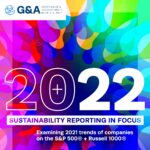(Published in the Australian Financial Review, 14 July 2004).
The number of Australian companies producing sustainability reports rose by around 27 per cent over the past year, according to a new study to be released today.
But the Australian Shareholders’ Association warned that such reports were an inexact science and that companies should not take on environmental and social responsibilities better left to government.
In all, 116 of 509 companies surveyed had publicly available sustainability reports, according to a study by the federal Department of the Environment and Heritage, KPMG, the Centre for Australian Ethical Research and Deni Greene Consulting Services.
Only one quarter of the companies that produced reports had them externally verified by an auditor.
The federal government’s Environment Australia agency has issued two guides to reporting on environmental indicators since 2000, and groups such as the Carbon Disclosure Project of institutional investors have written to companies asking them to report on the risks posed to their business by climate change.
The survey, The State of Sustainability Reporting in Australia, found the manufacturing sector produced 35.3 per cent of the reports and the mining sector 17.2 per cent, while property and business services contributed 6.9 per cent and electricity, gas and water 7.8 per cent.
KPMG manager of environment and sustainability services Stirling Habbitts said the study did not assess whether claims made in sustainability reports were accurate and did not compare companies.
The most cited reason for companies producing sustainability reports was "reputation enhancement", with 69 per cent of 98 companies saying it was a benefit.
Australian Shareholders Association deputy chairman Stephen Matthews said "we want to avoid at all costs the movement of government responsibility to shareholders".
"If an area is inappropriate for business to be in, for example asbestos, it’s up to the government to legislate and prevent companies being in that business," he said.
Sustainability reports were often "unreliable attempts to give a mathematical value to things that can’t be compared mathematically".



